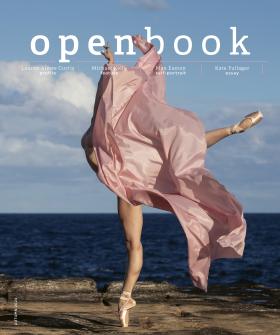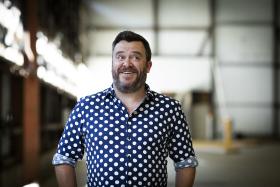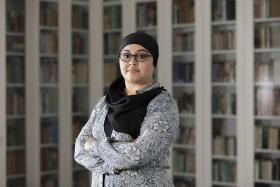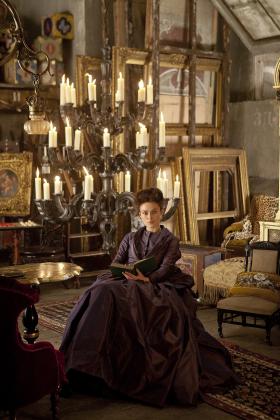‘Anybody who says they don’t read their Audible reviews is lying,’ says Rupert Degas. The British-born actor turned Sydneysider is one of Australia’s most in-demand audiobook narrators. He’s performed, as he likes to put it, more than 300 books since recording his first one in London. Peter Carey’s True History of the Kelly Gang required someone who could bust out Irish, Scottish and English accents. The publisher helpfully added punctuation to Carey’s stream-of-consciousness text so Degas ‘knew where to breathe’.
Despite that novel’s challenges, Degas (pronounced day-gas) was hooked. ‘I thought, “Oh, I can play all the parts, I can do all the accents, I don’t have to put on a costume, I don’t have to learn any lines, I don’t have to get up at five in the morning and get into make-up — I quite like this!”’ he recalls.
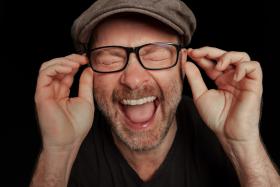
Today, Degas’s audiobook portfolio includes Haruki Murakami’s The Wind-up Bird Chronicle, Kafka’s The Trial and Australian author Chris Flynn’s Mammoth, a comic novel narrated by a prehistoric mammoth. ‘It was like a play within a play — I did the mammoth as Orson Welles,’ Degas says. The captivating result was a finalist for the 2021 ABIA (Australian Book Industry Awards) Audio Book of the Year.
Degas is from a showbiz family. His screenwriter father, Brian Degas, famously convinced Hollywood legend Gloria Swanson to pen her autobiography after he’d already inked the publishing deal and his mother, Maggie Clews, presented on British radio and TV. Degas could probably write his own book — except he’s too busy narrating them.
He records a dozen or more each year from his favourite studio — his home set-up in Sydney’s eastern suburbs. ‘It takes me four weeks to do a book,’ he says. ‘I do a chapter here, a chapter there — I dip in and out of it. I don’t get to that point where I’m flagging because I’m just in the story.’ He’s also his own audio engineer. ‘I’ve got one hand on the mouse controlling [audio recording software] Pro Tools and another hand on my laptop controlling the script,’ he says. ‘I’m finding words and stopping recording to go to pronunciation websites to find out how to pronounce them properly. So there’s a lot going on and that means your brain is just working extra-hard.’
Thanks to technology — and boosted by the pandemic — audiobooks are booming. The US audiobook market alone was estimated to be worth US$1.1 billion in 2021. Book publishers are so attuned to audiobooks’ possibilities they now release new titles in print and audio formats simultaneously.
So how are Australian publishers keeping up with demand? Veronica Eze, audio producer for Penguin Random House (PRH) Australia, says many titles are recorded at an in-house studio in Sydney. The publisher also uses a network of external studios around Australia, such as Sound Kitchen in Sydney’s Crows Nest.
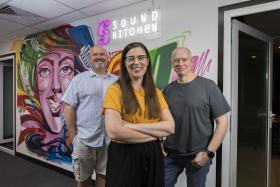
Today, Sweeny’s good looks don’t matter. This job is all about his voice. He’s here to narrate Endurance: The Toby Price Story, a biography of the Australian two-time Dakar Rally champion and seven-time Finke Desert Race winner who’s so famous for his mullet that fans buy mullet-themed merchandise.
Sound Kitchen instructs narrators to sit (in a non-squeaky, non-swivelling chair) and face a grey-walled corner so they’re not distracted by their audio engineer’s movements. I pop in behind engineer Ben Crabbe to see Sweeny at work. Crabbe has slipped off his shoes and is following along with the text on an iPad, picking up missed or messed-up words and asking for a redo, marking spots where edits are later required.
The process between voice talent and engineer is highly interactive. Both men stop to ponder the pronunciation of Arequipa — a city in Peru. I make myself useful, saying it for them. When it comes to Australian place pronunciations, Crabbe says if in doubt, he’ll call a police station or school near the place to ask how it’s said.
In the other studio Anna Clark, granddaughter of esteemed historian Manning Clark, is recording her first audiobook — her hefty tome Making Australian History (both were released simultaneously in February by Penguin Random House, like Prices book and audiobook). Unlike Sweeny, who simply backs up and starts again when he makes a mistake, Clark reflexively says ‘Sorry’ each time she fumbles a word.
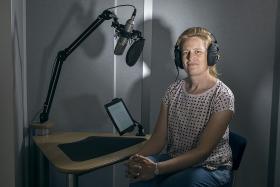
‘When I was invited to read it,’ Clark says, ‘I thought, “Yeah, that sounds great — I know my work, what a fun thing to do!” I’ve just finished day two [of six scheduled days] and it’s actually really tiring. I thought it would be easier.’ Even though she knows her text inside out, ‘reading it out loud is like reading it anew — it feels like a new iteration’. Pronouncing some of the alliteration, she’s discovered, is problematic. ‘I was so proud of putting it in there for emphasis and, now that I’m reading it, they’re total tongue-tiers,’ she says. ‘No more alliteration!’
Recording and directing Clark from behind a glass window is Bill Dowling, Sound Kitchen’s director/audio engineer. Sound Kitchen recorded more than 80 audiobooks last year. Dowling says smartphones have played a pivotal role in audiobooks’ popularity. ‘The way you can listen to audiobooks is so much easier now ... and the fact publishers are now seeing the value in it is even better,’ he says.
Publishers might have preferences about voice talent for an audiobook — or they might ask Sound Kitchen to help cast a voice. Karly Joyce, Sound Kitchen’s studio manager/audio producer, says, ‘There are about six agencies we go to that represent Sydney talent — there are three main voice-over agencies and then there are also acting agencies. We tend to find that actors are really good for fiction because they become the characters in the story. They feel it a bit more.’
Sound Kitchen also directs plenty of first-time narrators. Dowling says, ‘If they can read without sounding like they’re reading, we can do anything with them. If they’re nervous and sound like they’re reading, we’ve had to recast a couple of times.’ Once the initial recording and edits are done, files are sent to audio proofers for a quality check against the text and to pick up unintentional noises. The talent returns to the studio to record pick-ups. Once those are added, the audiobook is ready to be mastered. ‘I’d estimate that every finished hour of a book would be about five hours’ worth of work,’ says Dowling. Audiobooks usually take about six weeks to travel through the studio’s production cycle.
The sensitive studio microphones pick up the tiniest of noises. ‘Tummy rumbles are our biggest hazard,’ says Joyce. ‘Bill tells everyone to eat bananas.’ The list also includes wrist clicks, finger taps, throat gurgles, fabric rustles and jangly earrings. For the talent, drinking milk is a no-no but apples can, apparently, reduce mouth noises. Voice actors are also told to stay hydrated and to take a walk outside to refresh their energy levels. ‘It’s a matter of keeping them vibed so you don’t hear that lag in their voice,’ says Dowling. ‘As soon as I pick that up, I say, “Stand up and have a stretch.”’
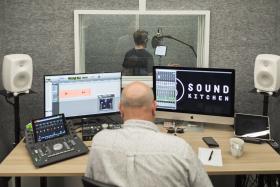
‘For Archie to agree to record that on Country made it a very special project and it’s close to our hearts,’ says Ruffino. ‘We normally like to have a simultaneous audio production available when we release the print book but we were happy to wait until Archie had the time to record it. He’s a little frail so it was going to take a bit longer but now his voice and his stories are recorded for prosperity — it’s an amazing gift.’
When Roach’s audiobook followed the hardcover four months later, it gave the title ‘a second life’, Ruffino says. ‘A lot of people who bought the print book were happy to own an audio edition as well,’ he says. ‘It’s also one of the very few examples of when we produced a physical audiobook — everyone’s just doing digital now — but we produced a handsome CD version as well. We did that for Dave Grohl and Bruce Springsteen too. You’ve got to be of that calibre.’
Fiction fans might be dedicated to their favourite narrators but Ruffino acknowledges there’s ‘massive demand’ for celebrity-narrated audio. Downloads in Australia for Grohl’s biography, The Storyteller, were ‘a real eye-opener about the potential in this space’, he says. Audiobooks from comedians Judith Lucy and Kate Langbroek also performed well, Ruffino says, along with titles from Dr Michael Mosley. ‘People are happy to listen to health books in that format, which has been interesting for us,’ he says. The company’s website promotes ‘notable narrators’ such as Lucy and actors Claudia Karvan, Zoe Carides and Catherine McClements. ‘We’d also seek permission from them to use their narration in a radio ad or a YouTube video to promote the book,’ says Ruffino. ‘So the voice is used as part of the advertising campaign.’
Ruffino says all narrative fiction and non-fiction on his Australian list, along with some children’s books, become audiobooks. In 2021, Simon & Schuster produced 23 original audiobooks for Australia and New Zealand, and bought rights to another 23. ‘We sold off our rights to audio on some of the titles a few years ago but we won’t do that now,’ he says. ‘Publishers were reluctant to spend all that money [on audiobook production] at the time with the market being so immature but that’s rapidly changed in the last two years.’ The company distributes titles on every available channel, from Audible through to library platforms.
PRH’s Eze says non-fiction genres such as personal development, business, true crime and memoirs do well as audiobooks, along with crime fiction. ‘We don’t tend to produce audiobooks for titles that are quite visual, such as ones that showcase art or cookbooks, though we did just publish our first one, the hilarious Death to Jar Sauce by Nat’s What I Reckon,’ she says.
Australia’s audiobook market isn’t currently measured but in 2020 Nielsen Book, which crunches book sales data, released what it said was the first study of Australian audiobook consumer behaviour. It found that 40 per cent of respondents were influenced to try audiobooks by a YouTube review. It also found the biggest barrier for Australians to increase their audiobook consumption was price. A 2019 UK study found that not liking a narrator’s voice was the biggest impediment.
Dowling understands that. ‘Voices are like music — you might like a song I hate and vice-versa — and narrators are the same,’ he says. ‘If there’s something you hear in the voice that you love, you’ll search their name out and download whatever audiobooks they’ve done.’
For Ruffino, audiobooks are a no-brainer. ‘People might have less time to sit with a book but this is a way of getting back some reading minutes that we’ve lost,’ he says. ‘With the explosion of home speaker systems, in-ear technology and iPhones, it just makes the medium a lot easier to access. My house is full of Sonos speakers so I can be cooking, cleaning or whatever, and still have a book following me around.’
Katrina Lobley is a Sydney-based freelance writer.
This story appears in Openbook autumn 2022.

